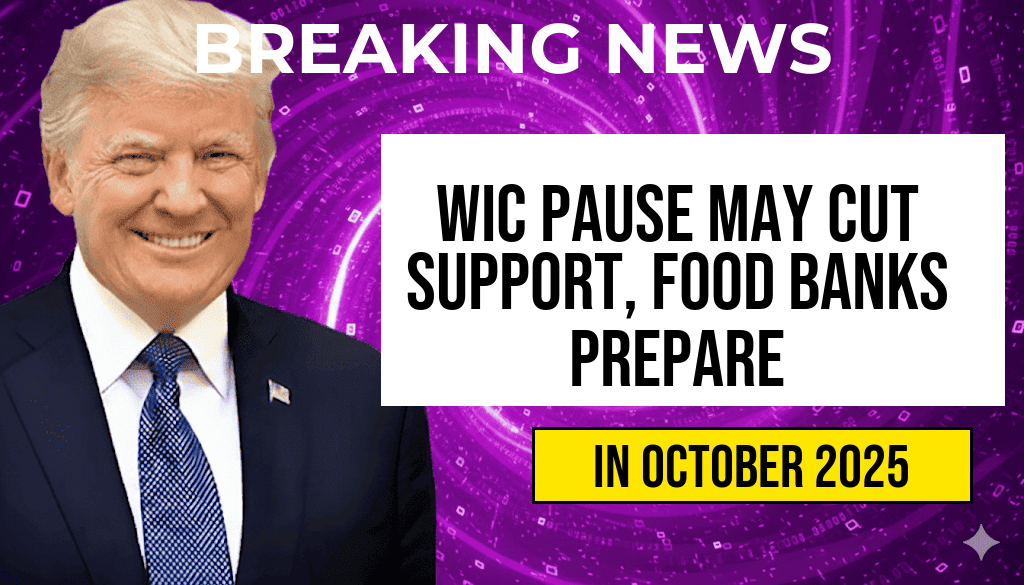The recent decision to pause the Women, Infants, and Children (WIC) program’s benefits has raised concerns among healthcare providers and food assistance organizations nationwide. The temporary suspension is expected to reduce monthly support by approximately $52 for breastfeeding parents, a change that could significantly impact low-income families relying on the program for vital nutrition. Food banks and community organizations are bracing for increased demand as families prepare to navigate the financial strain caused by the pause, which could last several months depending on federal funding cycles. This development underscores ongoing debates over program funding, nutritional support priorities, and the broader implications for maternal and infant health in vulnerable communities.
Understanding the WIC Program and Its Role in Maternal and Child Nutrition
The WIC program, administered by the U.S. Department of Agriculture (USDA),> provides nutritional assistance and education to pregnant women, new mothers, infants, and young children at nutritional risk. The program’s benefits include food packages, nutrition counseling, breastfeeding support, and referrals to healthcare services. According to the USDA, WIC serves over 6 million participants monthly, making it one of the nation’s largest nutrition assistance initiatives tailored specifically for maternal and child health.
Details of the Current WIC Benefits Pause
The pause is primarily related to the temporary suspension of certain supplemental benefits, including additional support for breastfeeding parents. The $52 monthly reduction specifically affects those who rely on WIC’s enhanced breastfeeding incentives, which aim to promote exclusive breastfeeding for infants up to six months old. This adjustment stems from funding reallocations and legislative delays in renewing supplemental appropriations, leading to a halt in some benefits that many families have come to depend on.
Impact on Breastfeeding Parents and Infant Nutrition
Breastfeeding is widely recognized for its health benefits, providing essential nutrients and immune protection to infants while fostering maternal health. The $52 decrease in monthly WIC support could make it more challenging for breastfeeding parents to sustain breastfeeding practices, especially for those already facing economic hardships. For many families, WIC’s breastfeeding incentives help offset costs associated with lactation supplies, nutritious foods, and related healthcare needs.
Health experts warn that reduced financial support might lead to decreased breastfeeding rates among low-income populations, potentially increasing reliance on formula feeding, which can be more costly and less accessible in some areas. The American Academy of Pediatrics emphasizes the importance of breastfeeding support for infant health and development, stressing that disruptions in assistance can have long-term health implications.
Food Banks and Community Organizations Prepare for Increased Demand
As WIC benefits face temporary cuts, food banks across the country anticipate a surge in demand. Many families may turn to local food assistance programs to fill nutritional gaps left by reduced WIC benefits. Food banks are already strategizing to manage the expected influx, with some increasing inventory and outreach efforts to ensure vulnerable populations receive adequate support.
| Region | Estimated Increase in Food Bank Visits | Additional Food Assistance Needed (per month) |
|---|---|---|
| Midwest | 15% | 2 million pounds |
| South | 20% | 3.5 million pounds |
| Northeast | 12% | 1.2 million pounds |
Local agencies emphasize the importance of coordinated efforts to support families during this period, including increased outreach and partnerships with healthcare providers. Nonprofit organizations are also mobilizing to provide supplemental nutrition and breastfeeding support services, aiming to mitigate the potential health disparities caused by the benefit reductions.
Broader Policy and Funding Context
The pause in WIC benefits highlights ongoing debates about federal nutrition program funding and the priorities set by lawmakers. Budget constraints, legislative delays, and shifting political landscapes contribute to uncertainty around program stability. Advocates argue that sustained investment in maternal and child nutrition programs is essential, especially in light of rising food costs and economic instability affecting low-income households.
Some policymakers are calling for emergency funding measures to restore full benefits promptly, citing research that links adequate nutritional support with improved health outcomes and reduced long-term healthcare costs (source). Others warn that continued delays could exacerbate health inequities and place additional strain on community resources.
Looking Ahead: Potential Policy Responses and Community Resilience
Stakeholders across the healthcare and social service sectors are urging federal officials to prioritize the restoration of WIC benefits. Some local governments are exploring interim measures, such as emergency food assistance programs and breastfeeding support initiatives, to bridge the gap during the suspension.
Community resilience and collaboration will be critical in addressing the short-term challenges posed by the program pause. As families adapt to these changes, the emphasis remains on ensuring that vulnerable populations do not experience setbacks in maternal and infant health outcomes.
For more information on WIC and nutrition assistance programs, visit USDA WIC Program.
Frequently Asked Questions
What is the reason for the pause in the WIC Program?
The WIC Program has been temporarily paused due to funding or policy adjustments, which could impact the level of support provided to participants, especially breastfeeding parents.
How might the WIC Program pause affect breastfeeding parents financially?
Breastfeeding parents could see a reduction of approximately $52 in monthly support, potentially making it more challenging to access necessary nutrition and resources.
What preparations are food banks making in response to the WIC Program pause?
Food banks are increasing their inventories and outreach efforts to assist families who may face greater food insecurity due to the reduction in WIC support.
Will the WIC Program support resume after the pause?
Officials have not specified an exact timeline, but efforts are ongoing to restore the full support levels and minimize the impact on families relying on WIC benefits.
How can breastfeeding parents and families prepare for the potential impact of the WIC pause?
Families are encouraged to explore additional community resources, connect with local food banks, and stay informed about updates regarding the resumption of WIC services.






